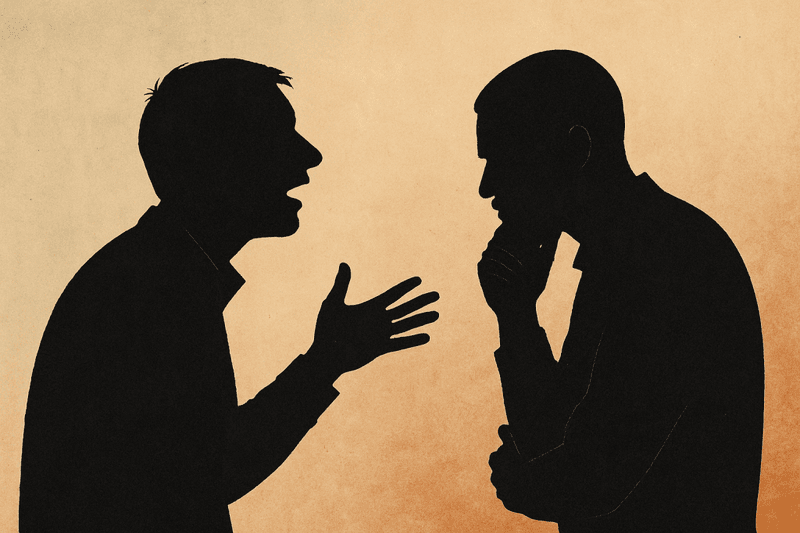Think It’s A Quirk? These 19 Habits Are Hidden Trauma Responses
Many behaviors we consider as mere personality quirks may actually have deeper roots. Often, these habits are silent echoes of past experiences, reflecting feelings and fears that have never been fully resolved.
By understanding the subtle transformations that trauma can create in our daily actions, we can approach ourselves and others with greater empathy and insight. Here are 19 such habits that are more than just quirks—they are responses originating from emotional wounds.
1. Laughing at everything—even when it’s not funny

Ever caught yourself laughing in situations where humor seems absent? This response, often attributed to a quirky personality, can be a mask to hide discomfort. The laughter serves as a shield against vulnerability, making awkward situations less threatening.
People who have faced emotional turmoil might use laughter to deflect attention from their true feelings. This habit helps them navigate social settings without revealing their inner struggles.
In their past, laughter might have been a tool to diffuse tension or avoid conflict. Now, it’s an automatic reaction, a way of saying, “I’m fine,” when the reality is more complex.
2. Needing to over-explain everything, just in case

Explaining things in exhaustive detail can seem like a meticulous trait, but it often stems from a fear of misunderstanding. This habit can originate from a past where being misunderstood had difficult consequences.
For those who have experienced harsh judgment, over-explaining becomes a tool to ensure clarity and acceptance. It’s not just about being understood; it’s about safeguarding against rejection.
This behavior reflects a deep-seated need for assurance. Each extra word is a buffer against the anxiety of being misinterpreted, a way to control outcomes in an unpredictable world.
3. Apologizing constantly, even when you’re not wrong

For some, apologies are as frequent as greetings. This behavior, often seen as a charming politeness, can hint at deeper issues of self-worth. The habit of constant apologizing may originate from environments where one felt perpetually at fault.
In relationships or households where blame was abundant, an apology becomes a protective reflex. It’s a way to maintain peace, to seem cooperative, even at one’s expense.
This continuous need to say “sorry” can be a silent plea for acceptance. It’s about preempting conflict, trying to smooth over potential disruptions before they even arise.
4. Avoiding confrontation like it’s life-threatening

Avoiding confrontation is often mistaken for being easygoing. However, it can be rooted in the fear of conflict, learned from past experiences where disagreements led to emotional pain.
For individuals who’ve witnessed or endured volatile arguments, avoiding confrontation becomes a means of self-preservation. It’s about safeguarding emotional well-being by steering clear of potential hurt.
This habit reflects an underlying fear of chaos. It’s about keeping the peace, even if it means suppressing one’s own needs and feelings in the process.
5. Never asking for help because “you’ve got it”

The refusal to ask for help is often seen as a sign of strength. Yet, it can mask a belief that relying on others is risky. This habit might emerge from past experiences where support was unreliable or conditional.
For some, self-sufficiency is a shield against disappointment. By not asking for help, they avoid the potential of being let down.
This behavior speaks of survival strategies. It’s about taking control, ensuring that one’s needs are met without vulnerability to others’ whims.
6. Feeling guilty for resting or relaxing

Rest should be rejuvenating, yet for some, it comes with a heavy dose of guilt. This feeling can stem from environments where productivity was valued over personal well-being.
In homes where rest was equated with laziness, individuals learn to associate relaxation with failure. The guilt becomes a constant companion during downtime.
This mindset reflects an ingrained belief that worth is tied to constant activity. It’s about proving one’s value through relentless busyness, even at the cost of personal health.
7. Pushing people away before they can leave

Pushing others away might appear as a need for space, but often, it’s a preemptive strike to avoid abandonment. This habit might stem from past experiences of loss or unexpected departures.
For individuals who’ve been left behind, creating distance becomes a strategy to protect against heartache. It’s easier to push away than to face the pain of someone leaving.
This behavior speaks of a defense mechanism. It’s about taking control of the narrative, ensuring one’s heart is spared from the unpredictability of others’ actions.
8. Reading between the lines of every text

The habit of scrutinizing every message for hidden meanings can seem like an insightful trait. However, it may originate from a past filled with unspoken tensions and underlying conflicts.
For those who grew up in unpredictable environments, hyper-vigilance in communication becomes second nature. It’s a way to anticipate and prepare for potential challenges.
This behavior is about seeking reassurance. It reflects a need to decode every nuance, a quest to unveil the ‘real’ message behind the words.
9. Being overly independent to a fault

Extreme independence is often admired, but at its core, it can reflect a reluctance to trust others. This habit might stem from past betrayals or disappointments.
For some, relying solely on oneself becomes a safety net. It’s about avoiding the vulnerability that comes with depending on others.
This trait speaks of resilience. It’s about conquering challenges solo, ensuring that one’s success is self-made and not contingent on external support.
10. Avoiding eye contact out of discomfort, not rudeness

Avoiding eye contact is often mistaken for disinterest or rudeness, but it can be a sign of discomfort. This habit might arise from environments where direct interactions led to anxiety or confrontation.
For individuals with past experiences of being scrutinized, avoiding eye contact becomes a protective measure. It’s about minimizing exposure to potential judgment.
This behavior speaks of self-preservation. It’s about navigating the world with caution, reducing the risk of emotional engagement that might lead to vulnerability.
11. Being overly accommodating—even when it hurts

Consistently putting others’ needs before one’s own can seem like a generous trait, but it often masks a fear of rejection. This habit may develop in settings where approval was conditional.
For those who learned that love must be earned, being accommodating becomes a way to secure belonging. It’s about ensuring acceptance, even if it requires personal sacrifice.
This behavior reflects an ingrained need to please. It’s about maintaining harmonious relationships, often at the cost of one’s own well-being and desires.
12. Distrusting compliments more than criticism

Compliments should be uplifting, yet for some, they are met with doubt. This reaction can stem from environments where praise felt insincere or manipulative.
For individuals accustomed to criticism, compliments might feel uncomfortable or undeserved. It’s about questioning the sincerity behind the words.
This habit reflects a trust issue. It’s about guarding against potential disappointment, choosing to believe in tangible feedback over flattering words that might hold ulterior motives.
13. Making jokes out of your own pain

Turning pain into humor can seem like a unique talent, but often, it’s a way to cope. This habit might develop from past experiences where vulnerability was uncomfortable or unsafe.
For some, humor becomes a shield to deflect attention from their struggles. It’s about controlling the narrative, deciding how their pain is presented to the world.
This behavior speaks of resilience and creativity. It’s about transforming personal challenges into something more palatable, making light of darkness to diffuse its weight.
14. Hyper-analyzing your tone, words, and presence

Constantly assessing one’s own words and actions can seem like self-awareness, but it often signals insecurity. This habit might stem from environments where social interactions were fraught with tension.
For those who fear judgment, hyper-analysis becomes a way to preempt criticism. It’s about striving for the ‘perfect’ interaction.
This behavior reflects an unending quest for acceptance. It’s about navigating social landscapes with caution, always aiming to present oneself in the best possible light to avoid reproach.
15. Shutting down emotionally when you feel misunderstood

Emotionally withdrawing when misunderstood might seem like a defensive stance, but it often hides deeper wounds. This habit can develop from past interactions where vulnerability wasn’t reciprocated.
For some, shutting down becomes a way to protect against further misunderstanding and emotional hurt. It’s about building barriers to shield against perceived rejection.
This behavior reflects a reluctance to expose oneself to potential misinterpretation again. It’s about retreating into a safe emotional space, where one feels secure and in control.
16. Feeling like a burden even when people show up for you

Feeling like a burden despite support may seem paradoxical, yet it often roots from past experiences of neglect or unmet needs. This habit reflects an internalized sense of unworthiness.
In environments where dependency was frowned upon, accepting help becomes difficult. The fear of being a nuisance overshadows the reality of genuine support.
This behavior speaks of a struggle with self-esteem. It’s about reconciling the gap between perceived and actual worth, learning to accept care without guilt.
17. Expecting chaos when things feel “too good”

When life feels ‘too good,’ expecting chaos may seem like pessimism, but it often stems from past experiences where stability was fleeting. This habit reflects a learned anticipation of disruption.
For those who’ve faced unpredictable challenges, peace can feel unsettling. The mind braces for the chaos that once followed calm.
This behavior speaks of resilience in uncertainty. It’s about preparing for potential upheavals, ensuring one is not caught off guard if stability proves temporary.
18. Perfectionism at All Costs

Perfectionism might seem like an admirable trait, but it often comes from a deeper place of fear and insecurity. If every task must be flawless, this desire for perfection can be a coping mechanism developed from past criticism or failure.
Striving for flawlessness, while commendable, becomes problematic when it results in chronic stress and burnout. This behavior may mask an underlying fear of judgment or rejection.
Perfectionists often feel immense pressure to meet unrealistic standards. It’s crucial to recognize when this trait is hindering rather than helping, reflecting a hidden trauma response.
19. Over-Scheduling as a Distraction

Filling every minute of the day can be a way to avoid confronting deeper emotions. Over-scheduling often serves as a distraction from feelings of inadequacy or unresolved trauma.
While staying busy may seem productive, it often leads to exhaustion and can prevent genuine relaxation. This behavior is a way to silence inner turmoil by avoiding quiet moments.
Recognizing the need to always be busy can illuminate underlying issues. It’s important to find balance and allow time for reflection, as constant activity can be a hidden trauma response.






